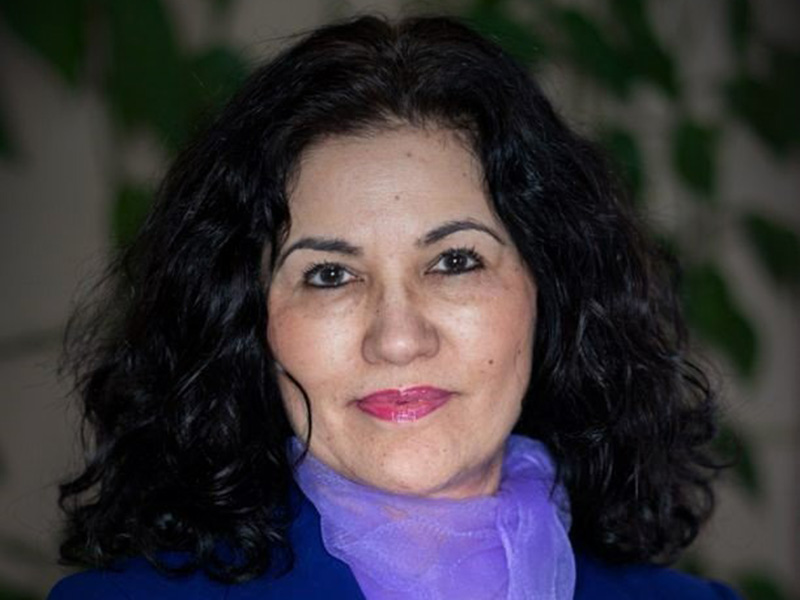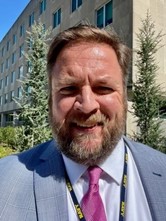Fall 2021: Rushan Abbas, Nick Turse
Spring 2022: Jeffrey Sizemore, Vahidin Omanovic, Yasmin Ullah
Rushan Abbas, Founder and Executive Director, Campaign for Uyghurs
Time at I-GMAP: September 20-22, 2021

From 2002 till 2013, Ms. Abbas translated for the 22 Uyghurs who were being held in Guantanamo and worked closely with the US Department of Defense, Department of Justice, State Department, and US administration with their efforts on resettlement of 22 Uyghurs from Guantanamo Bay to Albania, Sweden, Bermuda, Palau, Switzerland, El-Salvador, and Slovenia. In 2017, Rushan Abbas founded the Campaign for Uyghurs to advocate and promote human rights and democratic freedoms for Uyghurs, and mobilize the international community to act to stop the human rights atrocity in East Turkistan.
Ms. Abbas frequently briefs US lawmakers and officials on the human rights situation in East Turkistan and testifies at the United States senate and congress on the Chinese regime’s crimes against humanity. She regularly appears on media outlets to advocate for the Uyghur cause and gives public speeches, having spoken for audiences at Holocaust museums, universities, U.S. embassies, grassroots groups, and more.
Webinar: "Responding to the Uyghur Genocide: Assessing Policy and Legislative Options for the U.S."
Panelists:
- Rushan Abbas, Founder and Co-Director, Campaign for Uyghurs
- Nury Turkel, Senior Fellow, Hudson Institute
- Brett Hansen, Foreign Service Officer, US Department of State
- Ewelina Ochab, Co-Founder, Coalition for Genocide Response, UK
- Sophie Richardson, China Director, Human Rights Watch
In our first webinar of the 2021-2022 academic year, we held an engaging two-hour discussion assessing policy and legislative options for the United States to respond to the Uyghur genocide. Our distinguished guests explored questions related to ongoing efforts by the U.S. government to pass legislation and enact policies to protect Uyghurs and stop the ongoing mass atrocity crimes being committed against them. Our panelists included Rushan Abbas, founder and executive director, Campaign for Uyghurs; Nury Turkel, senior fellow, Hudson Institute; Brett Hansen, Foreign Service Officer, US Department of State; Ewelina Ochab, Co-Founder, Coalition for Genocide Response; and Sophie Richardson, China Director, Human Rights Watch.
In the first part of the conversation, we explored the various actions taken by the US government to respond to the ongoing mass atrocity crimes along with the observed inaction in recent weeks. The panelists stressed the need for urgent action because Xi Jinping, President of the People's Republic of China, is calling for a final solution to the Uyghur problem, as Rushan recounts. Rushan outlined that the government is building crematoria near the detention centers despite cremation not being a tradition of Uyghur culture. In this discussion, the panelists focused on the need for the US government to develop a long-term and multilateral approach to confront China on this issue and other human rights abuses.
We must examine supply chains and boycott companies that use products known to be made by forced labor, the panelists urged. They noted that the US government agency tasked with reviewing products origins is understaffed and has had a weak response to effectively block slave labor products from entering the U.S. market. Rushan pointed to the Coalition to End Forced Uyghur Labour as an example of informing consumers about which product to boycott. The panelists also stressed the need for consumers to pressure companies, shareholders, and pension funds to divest from companies that profit off of the forced labor.
The conversation then shifted to encouraging Muslim-majority countries to help support Uyghurs and how the United States can partner directly with these countries in support of this effort. In this space, the United States has a lot of space to build capacity and focus more efforts in diplomacy. Rushan and Nury offered suggestions for the United States to work harder with civil society and religious leaders in Muslim-majority countries and assist in efforts to counter the Chinese government’s disinformation campaign about what is going on in Xinjiang. The audience was cautioned that this may be an uphill battle because many of these countries have human rights abuses of their own and may be more inclined to side with China.
Finally, the panelists focused on the genocide determination and reasons for why China is committing mass atrocity crimes. Rushan spoke about the history of the region and the importance of the geographical area of the Uyghur homeland to the Belt and Road Initiative. She offered the perspective that by getting rid of the Uyghurs, China will have easier access to expanding its territorial influence into Central Asia and Eastern Europe. Sophie added that the Chinese government is continuing its efforts to remake the “Great Chinese Nation” which includes a dissent free society, and as long as the Uyghur culture does not fit into that project, it must be erased. In concluding, the panelists reminded us all that we are confronting ongoing mass atrocity crimes and that inaction is not an option. They suggest that the United States should immediately open its borders to Uyghur refugees and develop a longer term plan that is human focused and victim centered. Rushan concluded the panel with a call to reject cultural relativism on this issue and for immediate action to stop this evil for the future sake of humanity.
Public Talk: "Confronting the Uyghur Genocide"
In a public talk open to the entire Binghamton University community, Rushan Abbas, the founder and executive director of the Campaign for Uyghurs, offered an illuminating account of past and ongoing mass atrocity crimes in East Turkestan, or Xinjiang Province in the People’s Republic of China. She explored the history of the Uyghur people and the strategic importance of her peoples’ homeland to China’s Belt and Road Initiative. Her public talk concluded with engaging questions from the audience about what can we do as individuals and residents of the United States to help stop the Uyghur genocide.
Rushan began her talk with describing how millions of Uyghurs have been taken to concentration camps and gave detailed accounts of how Uyghurs detainees are not being re-educated, as the Chinese government now describes the purpose of these centers, but rather are being tortured and forced into unpaid labor. In addition, Rushan explained that the government is moving Han Chinese “relatives” to live in the homes of families whose family members are in the concentration camps. She called this policy, government sponsored mass rape.
She also explained how East Turkestan is in the middle of the Belt & Road Initiative, and that this is being used as a reason to commit mass atrocity crimes against the Uyghurs to remove them from the physical landscape. The Chinese government has stated that the people held in re-education camps have graduated, but Rushan questions where did they graduate to. She explains that the Uyghur detainees are being forced to work in factories in China proper, which has been exacerbated by factories shutting down due to the covid-19 pandemic.
Rushan shared with the audience that her sister was abducted by the Chinese government and her family has not been given proof of life in three years. In September 2018, her sister was arrested six days after Rushan spoke in public criticizing the Chinese government for the treatment of Uyghurs. Initially, the government denied that her sister was in detention and then later admitted that she was convicted to a 20 year sentence.
At the conclusion of her talk, Rushan offered suggestions for what we in the audience and collectively in the United States can do to help stop the mass atrocities against the Uyghurs. These included a boycott against companies that use products made from Uyghur forced labor, and a boycott of the Beijing 2022 Olympics. She also argued that the United States needs to take leadership on this issue as other countries are waiting to see what the U.S. will do. Furthermore, she advocated that other Muslim-majority countries need support the Uyghurs and join together to force China to stop committing mass atrocity crimes against the Uyghurs.
Dr. Nick Turse, Investigative Reporter
Time at I-GMAP: October 4-8, 2021

Turse has received a number of honors for his work including a Ridenhour Prize, a James Aronson Award, I.F. Stone “Izzy” Award, a Guggenheim Fellowship, a Lannan Foundation Writer's Residency, and fellowships at Columbia University, Harvard University's and New York University.
Public Talk, "'It Sounds Like a Really Important Story, But...' Can Collaborations with Academia Improve Press Coverage of Mass Atrocities?"
October 4, Nick Turse delivered a public presentation for the Binghamton University community.
Zoom Webinar, "Investigative Journalism at the Atrocity Frontline: A Conversation with Nick Turse and Maria Ressa"
On October 7, I-GMAP Co-Directors Max Pensky and Nadia Rubaii spoke with two investigative journalists on the atrocity frontlines, American reporter and New York Times best selling author Nick Turse, and acclaimed Philippine journalist, co-founder of the online news site Rappler, and subject of the documentary A Thousand Cuts, Maria A. Ressa. As noted in the opening message from the co-directors, less than 24 hours after her participation in our webinar, Maria was announced as a 2021 Nobel Peace Prize winner.
In this wide ranging conversation, Max and Nadia talked with Nick and Maria about the central role that journalism and journalists play in holding power to account and bringing transparency to the general population. Maria and Nick spoke about the dual pressures on journalists from above, by the government, and from below, disinformation on social media spread by millions around the world. Maria spoke about the crumbling of democratic institutions from within and outlined “lawfare” issues where, “democracy dies using the gavel in a courtroom.” This reinforces the need and justification for the “battle for truth,” especially as it relates to the number of deaths resulting from Duterte’s War on Drugs. Nick and Maria also focused on the exacerbated atrocity risks from covid-19 pandemic and the triggering events such as the upcoming Philippine elections. This reminds us of the essential need for facts and independent journalism.
Jeffrey Sizemore, Senior Advisor on Atrocity Prevention Bureau of Democracy, Human
Rights and Labor/Office of Security and Human Rights
U.S Department of State
Time at I-GMAP: Postponed TBD

Jeff received a bachelor’s degree in American Studies from George Washington University in 2001 and a master’s degree in National Security and Strategic Studies from the Naval War College in 2012.
Vahidin Omanovic, Co-Founder and Co-Director, Center for Peacebuilding
Time at I-GMAP: Postponed TBD

Yasmin Ullah, Rohingya Social Justice Activist and Poet
Time at I-GMAP: April 7-13, 2022

